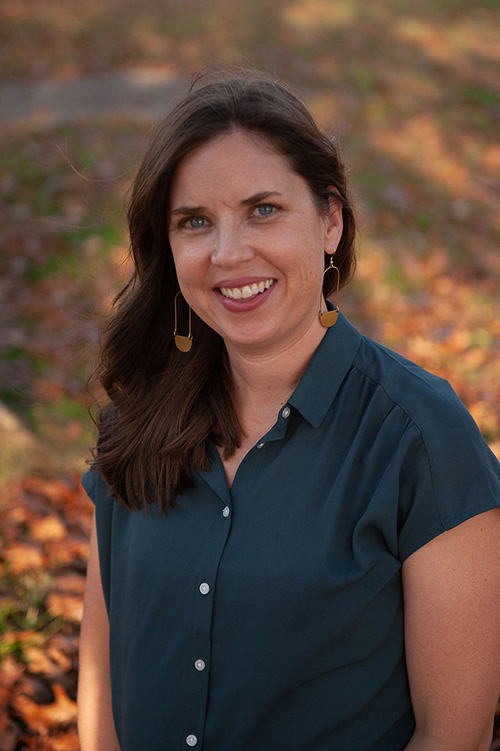Faculty Profile
Jamie Shinn


Associate Professor
Department of Environmental Studies
224 Marshall Hall
Education
PhD, Geography, Penn State University
MA, Geography, University of Kansas
BA, Environmental Science, Colorado College
Research
My scholarship examines climate adaptation, environmental governance, and disaster response and recovery. My research is particularly focused on these topics in relation to flooding, recognizing the power of water to shape lives and livelihoods, especially under conditions of climate change that are leading to more frequent and severe flooding events for already vulnerable people and places. I take a collaborative and mixed methods approach, with an emphasis on qualitative data collection, and I have regional expertise in Central Appalachia and Southern Africa. Below is a summary of current and past research projects. My full CV with a complete list of publications can be found here.
Disaster Recovery from Hurricane Helene in Western North Carolina: My newest project is funded through a RAPID grant from the National Science Foundation. This work builds on previous research in West Virginia and is a collaboration with partners at Warren Wilson College (located in Swannanoa, NC). Through a combination of Participatory Action Research (PAR) centered on storytelling methods, a survey, focus groups, and GIS, this community-engaged research project has three objectives: 1) Capture lessons learned about disaster response and recovery after the devastating impacts of Hurricane Helene in September 2024; 2) Promote the transfer of tools developed through previous research in WV to NC communities to assist with recovery; and, 3) Provide collective insights from WV and NC for improving disaster response and recovery efforts, especially in places with a high risk of inland flooding.
Transformation and Just Energy Transitions in West Virginia: This community-engaged project, funded by the Alfred P. Sloan Foundation, is a collaboration with Dr. Laura Kuhl of Northeastern University and Dr. Marla Perez Lugo, University of Texas, Rio Grande Valley. It uses the method of photovoice to examine how energy transformations in the US align with community priorities, through comparative case studies in West Virginia, Puerto Rico, and Massachusetts. You can read some early findings from the WV component of this project in the Bulletin of the Atomic Scientists.
Flood Vulnerably and Resilience in West Virginia: This recently completed project was funded by a grant from the National Science Foundation Civic Innovation Challenge program, and investigated sources of vulnerability and resilience to flooding in rural West Virginia, a region with significant flood risk and high levels of socioeconomic vulnerability. Our multi-disciplinary research team, which included state officials and nonprofit organizations, used community-engaged research methods to build the West Virginia Flood Resiliency Framework (WVFRF). The WVFRF is unique in the nation and includes a toolkit containing analytical and visualization tools to assist residents, local leaders, non-profits, and state officials to assess flood risk, prepare for flood disasters, and increase flood resilience for West Virginia communities. You can read the first publication from this project in The Professional Geographer. Findings from my previous work on flooding in WV can be found in The Journal of Political Ecology and Southeastern Geographer.
Transformation in International Climate Adaptation Finance: This project expanded previous research in Southern Africa to the international scale, based on the recognition that local-level climate adaptation is strongly shaped by higher-level dynamics. This collaborative project, with Dr. Laura Kuhl of Northeastern University, examined the role of climate finance in adaptation policy in the Global South, with a focus on how transformational adaptation is understood and funded. Our findings call into question international finance’s emphasis on techno-managerial and neoliberal economic approaches to adaptation and argue for funding of projects that are locally led and address structural vulnerabilities. You can read more about our findings in Nature, Climate Policy, and Climate and Development.
Environmental Governance of Variable Environments in Southern Africa: Beginning with my doctoral dissertation, this project focused on questions of environmental governance and climate adaptation in Southern Africa. Findings from this work highlighted how top-down governance strategies in variable climates can reduce the adaptive capacity of marginalized communities, with study sites in in Botswana and Namibia. The most recent publication from this project was published in Regional Environmental Change.
Teaching
I strive to bring my expertise into the classroom to give my students the interdisciplinary tools necessary to understand the social-ecological dimensions of some of the most critical environmental challenges in today’s world. I regularly offer these four courses:
EST 361: Diverse Histories of the American Environmental Movement (Offered every Fall semester)
EST 690: International Environmental Policy Consultancy (Offered every Fall semester)
EST 496/796: Water, Climate & Society (Offered every Spring semester)
EST 605: Qualitative Methods (Offered every Spring semester)
Current Graduate Advisees
 Andrea Cass
Andrea Cass
[email protected]
- Degree Sought: PHD
- Graduate Advisor(s): Shinn and Cousins
- Area of Study: Environmental Science
Graduate Research Topic
My research interests focus on human dimensions of the environment, including transformational adaptation, political ecology, and land-use planning, especially in rural and water-related contexts.
 Amy Owens
Amy Owens
[email protected]
- Degree Sought: PHD
- Graduate Advisor(s): Shinn and Artelle
- Area of Study: Environmental Science
Personal Statement
I'm interested in human-wildlife coexistence using animal behavior, local ecological knowledge, and climate change models to benefit both people and endangered species.
Graduate Research Topic
Human-wildlife coexistence
 Paul Sargent
Paul Sargent
[email protected]
- Degree Sought: PHD
- Graduate Advisor(s): Shinn and Moran
- Area of Study: Environmental Studies
 Joanna Ziegler
Joanna Ziegler
[email protected]
- Degree Sought: MS
- Graduate Advisor(s): Shinn
- Area of Study: Environmental Science